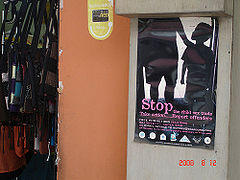
In Thailand, the nontheistic form of Buddhism called the Theravada school of Buddhism is prevalent.
According to a report compiled by Police Colonel Naras Savestanan, Ph.D., Deputy Director-General, Department of Special Investigation, Ministry of Justice, Thailand:
| “ | Thailand has been identified as one of the most popular destinations for child sex abusers since 1980s...
In 2007, there were 500,000 sexually alluring web pages and 250 websites showing nude video clips of teenagers in Thailand.[2] |
” |
Thailand’s Health System Research Institute declared that child prostitutes make up 40% of all prostitutes in Thailand.[3]
CNN reported concerning Thailand:
| “ | And Col.Apichart is clear the law needs reform.
"There is no specific law about having child pornography in possession," he said. "Thailand should issue the new law about child pornography specifically." Ronnasit Proeksayajiva is with a small NGO called the Counter Human Trafficking Unit. He works closely with Col. Apichart, often accompanying officers on raids. His assessment is frank -- and bleak. "Honestly right now I don't think it is getting better, I think it is getting worse, because I don't know, maybe they believe that Thailand is the best place for them to come to have sex with the children.".... Such cases do little to discourage pedophiles from coming to Thailand. Col. Apichart says online forums are abuzz with talk about Thailand being a child molesters' paradise.[4] |
” |
Evangelicals work to end child prostitution in Thailand
The Washington Post reported:
| “ | Sex work is such big business in Thailand that the International Labor Organization estimates, conservatively, that it generates 7 percent of the country’s gross domestic product. An ILO report from the late 1990s says sex workers sent home $300 million a year to rural areas, “more than any government development project.”
Not all sex work is done willingly, and some would argue that prostitution is by its very nature exploitative, as well as a driving factor for human trafficking — the sale, transport and profit from human beings who are forced to work for others, often referred to as the modern equivalent of slavery. Thailand is struggling to curb trafficking amid international pressure and dozens of American groups, many of them evangelical, have entered the country in recent years to fight the issue, with the blessing of U.S. foreign policy.[5] |
” |
See also
Notes
- ↑ Thailand fights to stem tide of child sex tourists By Dan Rivers
- ↑ Thailand’s Response to Online Child Sexual Abuse and Exploitation: Its Progress and Challenges, Pol.Col.Naras Savestanan, Ph.D. Deputy Director-General, Department of Special Investigation, Ministry of Justice, Thailand, The Commission on Crime Prevention and Criminal Justice: 20th CCPCJ, April 12, 2011, Vienna, Austria
- ↑ Kathoey Ladyboy: Thailand's Got Talent By Heinz Duthel, page 192
- ↑ Thailand fights to stem tide of child sex tourists By Dan Rivers, CNN
- ↑ [In Thailand, US evangelicals work to end prostitution] by Ruxandra Guidi, Religion News Service January 6, 2014, syndicated to The Washington Post